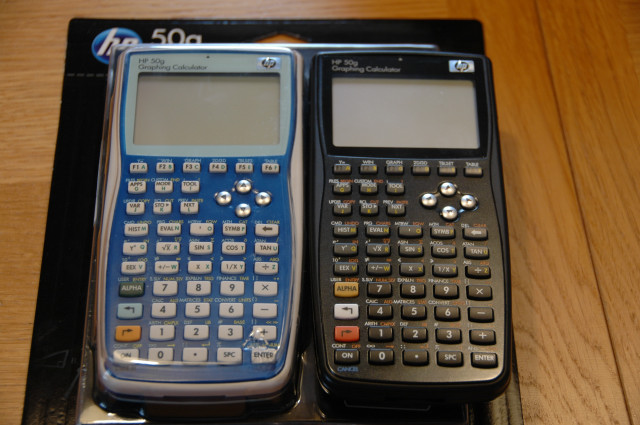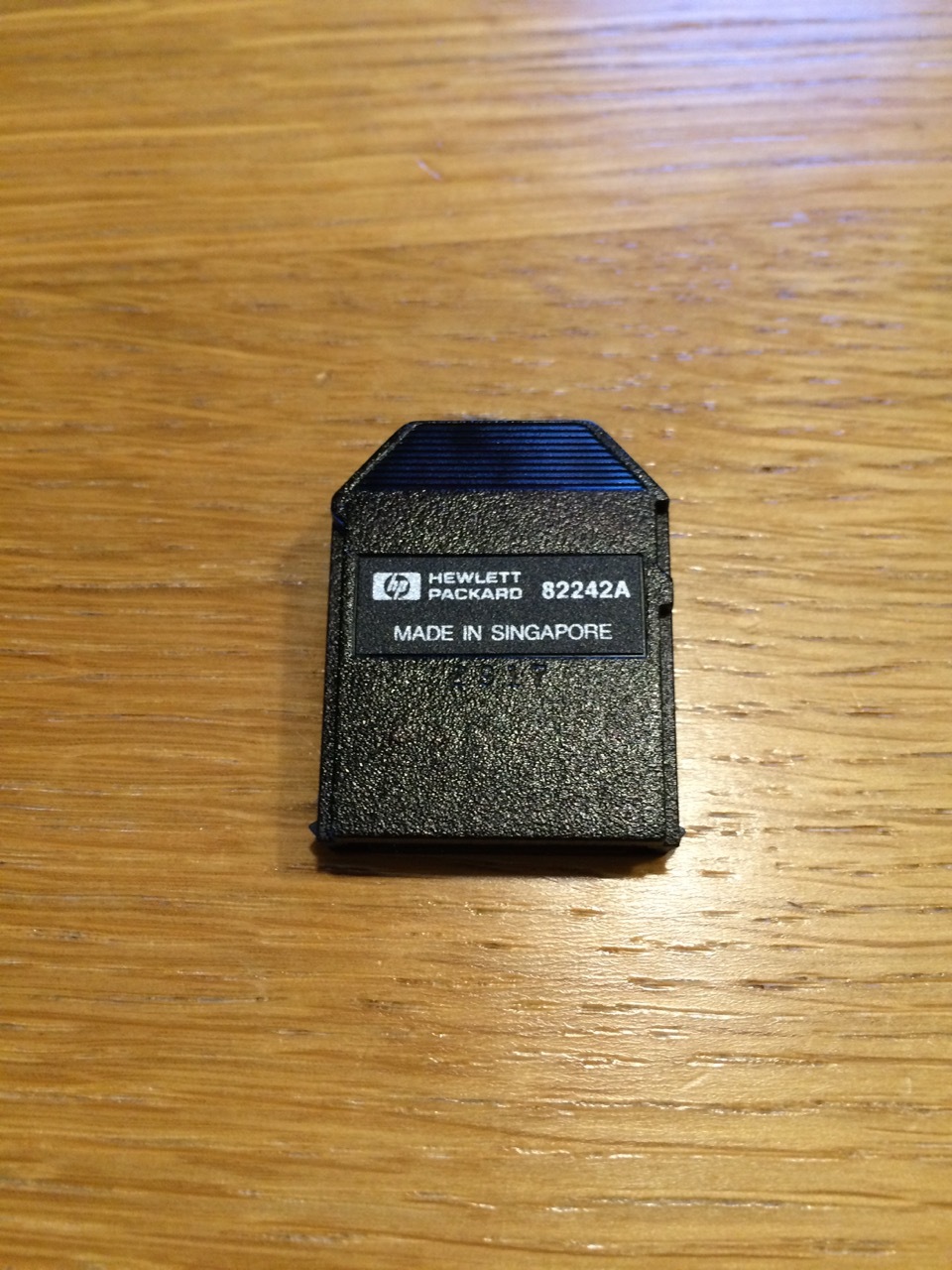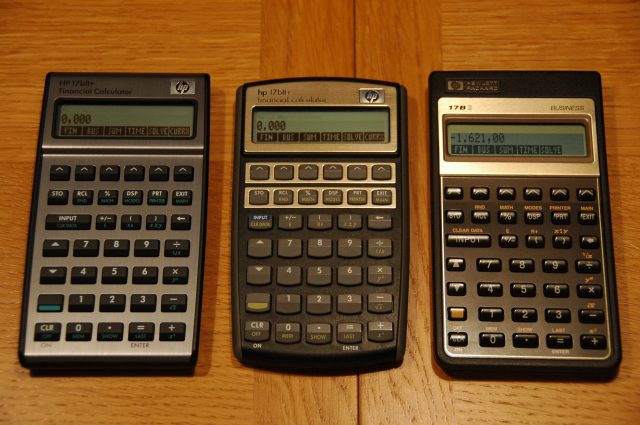Calculator Types Calculator blog
Calculator blog
Musings and comments about our common interest
Clarification on HP41CL pricing
A few comments regarding the pricing of the HP41CL units (for which I have received several enquiries)
The price is based on an assembled HP41C/CV units with the latest CL module from Systemyde. On top of that, there may be other options:
For a “plain” HP41CL, the cost is 609 €. This price includes VAT in European Union.
If a serial module + cable is added, the price is 649 €
If the calculator includes an original box with manuals, then the price is 725 €. The amount includes the serial module + serial cable.
Finally, if we’re able to locate a Time Module, with a typical standalone price of 150 €, you can buy it for 725 € for the base model, 774 with serial cable.
Be aware that this price can be valid for the current circuit lot!: the currency exchange ratio with USD will make future purchases much more expensive.
You need to take also into account that these units work perfectly, and have the original battery connector, with no signs of rusting, and sport all ports. When you buy a second hand calculator, you will find that some just don’t work - or you can’t make them to work, or you need to replace the battery connector with a repaired one, or the original case has deteriorated and produces the “black dust” that gets everywhere… We think that if you pay north of 600 €, you should only have excellent units - but we need to factor in all the units that were not so good and were left behind. This is roughly 30% of units!

New units coming in
Several news in our products:
-
There is a new boxed HP41CL in pristine state. The screen is not yellowish, the box comes with all manuals and even the stickers for your overlays are there! Pictures will follow.
-
We have also a very good, side-battery door HP19bII, with original manual in French.
-
And a new HP42S, just received. The bezel has some nicks, but barely appreciable. I have been playing with it, and it has warmed again my heart to it. RPN at its best, without its problems (try to use matrixes in any other RPN calculator, except the HP15c)
I will post all three in the website as soon as I can take the corresponding pictures.
On a different subject: we are quite sad to not being able to offer a good transport arrangement to our overseas customers. Even shipping outside the European Union is getting increasingly complicated for small shipments like ours. In the past, we were used to close to no paperwork. Now, with tax administrations trying to get resources from wherever they can, procedures are much stricter and therefore expensive. We will have to increase substantially shipment costs to the US
Final post on statistical distributions on HP Prime
Let’s us finish with the distribution functions for the HP Prime. Remember that we posted two blog issues about it: here and here.
All were taken from user Salvomic in HPmuseum. This is a monumental job and a great help for those that cannot bear to have an approximation when you can have the real thing.
Here are the last ones:
EXPORT rayleigh(s, t)
// Rayleigh distribution s=σ scale parameter, t>=0 var
// rayleigh(2σ2) = weibull(σ*sqrt(2),2)
BEGIN
local f;
f:= piecewise(t<0, 0, ((t/(s2))*e(-(t2)/(2*(s2)))));
return f;
END;
EXPORT rayleigh_cdf(s, t)
BEGIN
local f;
f:= piecewise(t<0, 0, 1 - e(-t2/(2*(s2))));
return f;
END;
Pareto distribution
EXPORT paretod(xm, a, k)
// Pareto distribution x_m >0 scale, a=α > 0 shape
BEGIN
local f;
IF ((a<=0) OR (xm <= 0) OR (k<xm)) THEN RETURN(“Use: xm > 0, a >0, k >= xm”); END;
f:=(a*xma)/k(a+1);
return f;
END;
EXPORT paretod_cdf(xm, a, k)
BEGIN
local f;
IF ((a<=0) OR (xm <= 0) OR (k<xm)) THEN RETURN(“Use: xm > 0, a >0, k >= xm”); END;
f:=1-(xm/k)^a;
return f;
END;
EXPORT paretod_bound(a, L, H, k)
// Bounded Pareto distribution
// a=α >0 shape, L>0, H>L location, k var
BEGIN
local f;
IF (a<=0 OR L<=0 OR H<=L) THEN RETURN(“Use a>0, L>0, H>L”); END;
f:= (a*La*k(-a–1))/(1-(L/H)^a);
return f;
END;
EXPORT paretod_bnd_cdf(a,L,H,k)
BEGIN
local f;
IF (a<=0 OR L<=0 OR H<=L) THEN RETURN(“Use a>0, L>0, H>L”); END;
f:= (1-La*k(-a))/(1-(L/H)^a);
return f;
END;
n-Erlang distribution
EXPORT erlang(k,l,n)
// n-Erlang distribution k shape parameter, l=λ >=0 rate parameter
// from Gamma d.; if k=1 -> erlang(1,l,n) = exponential(l,n)
// erlang(k,λ) = gamma(k,1/λ)
BEGIN
local f;
f:=piecewise(n<0,0, l<0, 0, ((lk)*(n(k–1)e^(-ln)))/(k–1)! );
END;
EXPORT erlang2(k, m, n)
//k shape parameter, m=μ=1/λ >=0 scale parameter
// if μ=2 -> chi2 with 2k degree of freedom
BEGIN
local f;
f:=piecewise(n<0,0, m<0, 0, (n(k-1)*e(-n/m))/((mk)*(k–1)!));
END;
EXPORT erlang_cdf(k, l, n)
// k shape parameter, l=λ >=0 rate parameter (μ=1/λ)
BEGIN
local f;
f:= 1- sum((1/X!)*(e(-l*n))*(l*n)X,X,0,k–1);
END;
Some more blue HP50g
 Until now, we have sold blue HP50gs in Spanish-Portuguese packaging. This has not affected users from buying the model, since it is well known that the calculator itself is only in English, and the box languages have only effect in the manuals printed and shipped with the machine. Now, when ordering from our distributor, we have received French, German, Italian and Dutch. Please write to sales@thecalculatorstore.com if you want to obtain one of these.
Until now, we have sold blue HP50gs in Spanish-Portuguese packaging. This has not affected users from buying the model, since it is well known that the calculator itself is only in English, and the box languages have only effect in the manuals printed and shipped with the machine. Now, when ordering from our distributor, we have received French, German, Italian and Dutch. Please write to sales@thecalculatorstore.com if you want to obtain one of these.
I have not decided myself which of the HP50g I like best. On one side, the black colour makes a "professional" impression; but, truth to be told, the contrast of the orange labels is limited - and probably a bad choice if you're visually challenged. I am begining to be so, when approaching half a century.
On the other hand, the blue colour HP50g looks younger, decidely student-like; but the letter contrast is so much better than the other.
The one depicted in the picture besides shows the Spanish-Portuguse model, just because it was the only picture available when writing this blog issue!
Absolute beginners' guide to the HP Prime
The HP Prime is a daunting prospect for those that left maths many years ago but still want to refresh it, or for youngsters that have one for class, but are completely frightened by its apparent complexity. I feel it myself: my math knowledge is too small and too old for most of the things that can be done with it.
Well, there is a French site that has created an abosolute beginners' guide to the HP Prime. You can find it here, in its English translation, courtesy of Moravia, an HP distributor in Europe.
http://www.hp-prime.de/de/file/download/...ages_m.pdf
I copy also the link to the French original. Not only for the French among our readers - it is another proof that oftentimes, the original reads better than the copy. The beauty of the French language helps, too (and I am not French!)
http://www.calculatrices-hp.com/uploads/pdf/Livret%20HP%20Prime_v2.pdf
I find especially interesting the programming part. Even though it is thought for French secondary school, it is thought-provoking and it gives you many hints to develop your programming skills with the HP Prime
Statistical distributions for the HP Prime - 2
We continue with the distributions as promised on last blog issue:
Beta Distribution:
EXPORT betad(a, b, n)
// Beta distribution: a=α>0, b=β>0 shape param, n var (0<=n<=1)
BEGIN
local f;
f:= piecewise(n<0 ,0, n>=1, 0, (1/Beta(a,b))*(n(a-1))*(1-n)(b–1));
return f;
END;
EXPORT betad_cdf(a, b, n)
BEGIN
local f, b1;
b1:= int((X(a-1))*(1-X)(b–1),X,0,n);
// incomplete beta function
f:=piecewise(n<0,0,n>=1, 0, b1/Beta(a,b));
return f;
END;
Gamma distribution
EXPORT gammad(a,l,n)
// Gamma distributio 1st formn a=α>0 shape param
// l=λ>0 rate param, n var
BEGIN
local f;
f:= piecewise( n<0,0, (l*e(-l*n)*(l*n)(a–1))/Gamma(a) );
END;
EXPORT gammad_cdf(a,l,n)
BEGIN
local f;
f:= int(X(a-1)*e(-X),X,0,l*n)/Gamma(a);
return f;
END ;
EXPORT gammad2(k,t,n)
// Gamma distribution 2nd form k>0 shape param,
// t=θ>0 scale param, n var
BEGIN
local f;
f:=piecewise(n<0,0, (n(k-1)*e(-n/t)) / ((tk) * Gamma(k)) );
return f;
END;
EXPORT gammad2_cdf(k,t,n)
BEGIN
local f;
f:= int(X(k-1)*e(-X),X,0,n/t)/Gamma(k);
return f;
END ;
Zeta distribution
EXPORT Zetazipf(s, k)
// Zeta (Zipf) distribution, not defined in s=1
BEGIN
local f;
IF s=1 THEN return “Not defined in s=1”; ELSE
f:= (k^(-s))/Zeta(s);
return f;
END; //if
END;
EXPORT Zetazipf_cdf(s,k)
BEGIN
local f, hks;
hks:= sum(1/(Xs), X, 1, k);
// nth generalized armonic number
f:= hks/Zeta(s);
return f;
END;
Laplace distribution:
EXPORT laplaced(m,b,n)
// Laplace distribution m=μ location param, b scale param, n var
// if m=0 and b=1 -> expond scaled by 1/2
BEGIN
local f;
f:= (1/(2b))e^(-(ABS(n-m))/b);
return f;
END;
EXPORT laplaced_cdf(m,b,n)
BEGIN
local f;
f := piecewise(n<n, (1/2)*e((n-m)/b), 1-(1/2)*e(-(n-m)/b));
return f;
END ;
Uniform Distribution
EXPORT uniformd(a,b,n)
// Uniform, distribution [a-b], n var
BEGIN
local f:= piecewise(n>=a AND n<=b, 1/(b-a), 0);
return f;
END;
EXPORT uniformd_cdf(a,b,n)
BEGIN
local f:= piecewise(n<a, 0, n≥b, 1, (n-a)/(b-a));
return f;
END;
start: postbit_signature
Multinomial Distribution:
The multinomial distribution is a generalization of the binomial distribution. For n independent trials each of which leads to a success for exactly one of k categories, with each category having a given fixed success probability, the multinomial distribution gives the probability of any particular combination of numbers of successes for the various categories.
EXPORT Multinomd(n, k, p)
// Multinomial distribution (n>0,{list k_i}, {list p_i})
BEGIN
IF ((type(k) ≠ 6) OR (type(p) ≠ 6)) THEN
return “2nd and 3th argument must be a list”; ELSE
IF n<1 THEN return “n must be >0”; END;
n:= ip(n); //n must be integer
IF (size(k) ≠ size(p) ) THEN return “items in k must be = those in p”; END;
IF (ΣList(k) ≠ n) THEN return “ΣList(k) must be = n”; END;
IF (ΣList(p) > 1) THEN return “ΣList(p) must be <= 1”; END;
// ΣList(p) should be = 1 but we can use in list k only values with no 0
//so items in p could be less than those in k…
return (n!/ΠLIST(k!))*ΠLIST(pk);
END; // if
END;
Statistical Distributions in HP Prime
There is an interesting article about statistical distributions for the HP Prime in hpmuseum.org. As you may know, the HP Prime comes with several functions to provide statistical distributions. The ones that come to my mind now are:
- Normal,
- T (Student),
- Chi-square,
- F (Fisher distribution),
- Binomial and
- Poisson.
These come in all three flavors: density, cumulative and inverse. So, compared with my beloved HP41CL, it is very well provided. But there are many other distributions that may be needed if you’re heavily into statistics. User Salvomic provides programs for several interesting cases. As he does not claim any copyright to them, and in the interest of the readers, I will post here the programs that create them. For the sake of reader comfort, we’ll post them in several installments, lest the page becomes too long!
Logistic Distribution:
EXPORT logisticd(m,s,k)
// Logistic distribution m=µ, s=s, k=x
BEGIN
local f,g;
g:= (k-m)/s;
f:=e(-g)/(s*(1+e(-g))^2) ;
return f;
END;
EXPORT logistic_cdf(m,s,k)
BEGIN
local f,g;
g:= (k-m)/s;
f := 1/(1+e^(-g));
return f;
END ;
EXPORT logisticd_icdf(m,s,p)
// inverse m=µ, s=s, p probability
BEGIN
local f;
f:= m+s*ln(p/(1-p));
return f;
END;
Lognormal
EXPORT LgNrm(m,s,k)
// LogNormal distribution m=µ, s=s, k=x
BEGIN
local f;
f:= (1/(kssqrt(2pi)))e(-(ln(k)-m)2/(2*s2));
return f;
END;
EXPORT LgNrm_cdf(m,s,k)
BEGIN
local f;
f := normal((ln(k)-m)/s) ;
return f;
END ;
Exponential
EXPORT expond(l,n)
// exponential distribution l=λ=1/np, n
BEGIN
local f;
f:= piecewise(n<0,0, le^(-ln));
return f;
END;
EXPORT expond_cdf(l,n)
BEGIN
local f;
f := piecewise(n<0, 0, 1-e^(-l*n));
return f;
END ;
Geometric
EXPORT geometric(n,p)
// Geometric distribution, n tries, p prob
BEGIN
local f;
f:= p*(1-p)^n;
return f;
END;
EXPORT geometric_cdf(n,p)
BEGIN
local f;
f := 1-(1-p)^(n+1);
return f;
END ;
Hypergeometric
EXPORT ipergeom(n,m,k,j)
// Hypergeometric distribution, n total, m one kind, k extracted, j var
BEGIN
local f;
f:= (comb(m,j)*comb(n-m,k-j))/(comb(n,k));
return f;
END;
Negative Binomial
EXPORT NegBin(r, p,n)
// Negative Binomial distribution observing until r success, with p probability of success
// n num trials for r success (k failures), n=r, r+1,…
BEGIN
local f;
IF (n<r) THEN return “n must be >= r”; ELSE
f:= comb(n–1, r–1)*(pr)*(1-p)(n-r);
return f;
END; //if
END;
EXPORT NegBin_cdf(r, p, n)
BEGIN
local f, b1, a, b;
a:=r; b:= n+1;
b1:= int((X(a-1))*(1-X)(b–1),X,0,p);
// incomplete beta function
f:=( b1/Beta(a,b));
return f;
END;
EXPORT NegBin2(r, p,k)
// Negative Binomial observing until r failures, with p probability of success (1-p failure)
// n num trials, k = n-r success
// i.e. NegBin(5,0.4,15) = NegBin2(5,0.6,10)
BEGIN
local f;
f:= (comb(k+r–1,k))*(pk)*((1-p)r);
return f;
END;
Gompertz
EXPORT gompertz(h,b,n)
// Gompertz distribution h=η shape param, b scale param, n var
BEGIN
local f;
IF (n<0 OR h<=0 OR b<=0) THEN return “Not defined for η or b < =0 or n <0”; ELSE
f:= bhe(b*n)*ehe(-h*e(bn)) ;
return f;
END; // if
END;
EXPORT gompertz_cdf(h,b,n)
BEGIN
local f;
IF (n<0 OR h<=0 OR b<=0) THEN return “Not defined for η or b < =0 or n <0”; ELSE
f := 1-e(-h*(e(b*n)–1));
return f;
END;
END ;
Weibull
EXPORT weibull(l, k, t)
// Weibull distribution: l=λ>0 scale param (characteristic lifetime), k>0 shape parameter t var (time)
BEGIN
local f;
f:= piecewise(t<0,0, (k/l)(t/l)^(k–1)e(-(t/l)k));
return f;
END;
EXPORT weibull_cdf(l, k, t)
BEGIN
local f;
f:= piecewise(t<=0,0, 1-e(-(t/l)k)) ;
return f;
END ;
EXPORT weibull_translate(l, k, t, v)
// Weibull distribution tranlated: v location parameter
BEGIN
local f;
f:= piecewise(t<=v,0, (k/l)((t-v)/l)^(k–1)e(-((t-v)/l)k));
return f;
END;
EXPORT weibull_translate_cdf(l, k, t, v)
BEGIN
local f;
f:= piecewise(t<=v,0, 1-e(-((t-v)/l)k)) ;
return f;
END ;
Cauchy
EXPORT cauchyd(x0,g,n)
// Cauchy distribution x0 location param, g=γ scale param, n var
BEGIN
local f;
f:= 1/ (pig(1+((n-x0)/g)^2)) ;
return f;
END;
EXPORT cauchy_cdf(x0,g,n)
BEGIN
local f;
f:= (1/pi)*atan((n-x0)/g)+1/2 ;
return f;
END ;
EXPORT cauchy_icdf(x0,g,p)
// inverse x0, g=γ, p probability
BEGIN
local f;
f:= x0+gtan(pi(p-(1/2)));
return f;
END;
HP infrared printer module
 We have added an infrared module, HP code 82242.
We have added an infrared module, HP code 82242.
This was a very good idea from HP. If you have used one of the printers with cable (of which we have also a couple of units), or the HP-IL connection, you would agree that it was a much better idea to have a wireless printing.
The module is fully compatible with the HP41cl (tested!) and with both HP82240A and B printers (which are available at 99 € new in our web too)
You will find it in the HP41c corner.
A boxed HP41CL and the HP19bII collectors' set
 We are putting together two new items:
We are putting together two new items:
-
A new HP41cl, coming from a version 41C, but boxed and with English manuals. It is already available as an option in the website. It is more expensive than the rest - but it is not so easy to get boxed units in good shape. More and more, we’re finding difficult to find units with un-corroded battery contacts. Yes, we know that this can be perfectly repaired with a repair kit, but some users may object to having a less-than-original calculator when they are paying north of 600 €.
-
A set of HP17bII, including all of the most significant models:
-
The original, brown color HP17bII
-
A black model - I have two available only, so only two persons will be able to have this pack
-
The gold, curvy HP17bII+
-
The latest, silver HP17bII+
-
With them, you have this part of the collection ready in just one swift stroke!
You will have the chance to compare all the different versions of what I feel is the most accomplished financial calculator ever made - and one of the 3 or 4 top calculators from HP - all types comprised.
(For the sake of clarity - the silver HP17bII in the pack is a new unit, in its original blister. You can choose in the instructions of the order which specific language you want it)
New HP12c set
There is a new product for the HP12c fanatics: a set of 4 different versions of the long-lived, standard setting financial calculator. It consists of:
- A used, bright keys HP12c
- A new, current HP12c
- A HP12c Platinum
- The last, HP12c 30th Anniversary edition
The combined price of all is 312 €, but the collector’s set sells for 280 - a 32 € off. It also includes free shipping within the European Union - and additional estimated 25 €. All in all, close to 20% off!
It’s your opportunity to enter in the HP12c area with a full collection from scratch.



